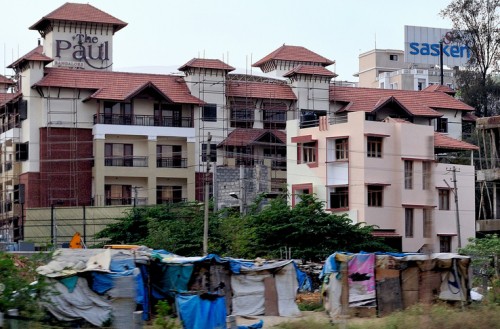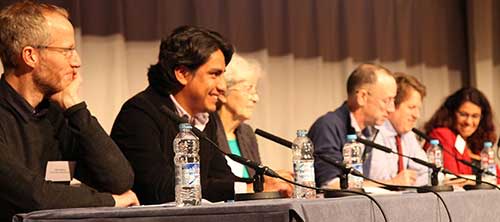Image: A construction site in Bangalore (Photo: (NZ)Dave, Flickr).
This month at DLP our focus is largely on corruption as we prepare for a collaborative event in London discussing ‘Corruption and development‘. Yet we could hardly fail to notice that inequality, a hot topic since Pikettymania and the theme of our conference earlier in the year, has resurfaced with a vengeance.
The IMF report of 15 June, Causes and consequences of income inequality, has a stark key message: “When the rich get richer, benefits do not trickle down.” In May the OECD published its own take on inequality, In it together: why less inequality benefits all. And earlier this month the Ford Foundation, one of the most influential philanthropy institutions in the world, announced that all its funding would be channelled towards redressing inequality.
Here’s a taste of it, from the OECD (PDF, 1.7 MB):
“Some may consider that the social and political costs of high and rising inequality are in and of themselves sufficient to justify action. The central argument of this publication is different. It is that, beyond its serious impact on social cohesion, high and often growing inequality raises major economic concerns, not just for the low earners themselves but for the wider health and sustainability of our economies. Put simply: rising inequality is bad for long-term growth.”
Absolutely. We agree with all of this. But crucially, as always, we’re concerned by the how; how inequality is rising and how it can be reversed. Our contention is that this often involves politics.
Given this recent push on inequality, I enjoyed returning to a recording of our star-studded roundtable at The Politics of Inequality conference to hear from the panellists.
Inequality is on the agenda; the politics of inequality isn’t. Yet.
As Ricardo Fuentes-Nieva observed: “A few years ago it was really impossible to talk about this topic of inequality and that has changed.” Explaining inequality has become a mainstream trend and high-level political processes have reflected this. But Ricardo also asked what this meant for the distribution of formal and informal power. Yes, inequality is on the agenda, but the mainstream debates still remain pretty much silent on the role of politics as a process.
Sam Hickey posed the “wider problem”, the suggestion that the way forward is to go with the grain and push ideals such as accountability to the back of the queue. Yet a social justice approach informed by rights-based thinking cannot accept the eternal postponement of democracy and accountability in the name of getting things done.
But there are encouraging signs from both the IMF and OECD that politics and fairness are beginning to get some elbow room in the debate. Alongside its many charts and GDP statistics, the IMF also says:
“High and sustained levels of inequality, especially inequality of opportunity can entail large social costs … [and] undermine individuals’ educational and occupational choices. [It gives] an incentive to divert their efforts toward securing favored treatment and protection, resulting in resource misallocation, corruption and nepotism … citizens can lose confidence in institutions, eroding social cohesion and confidence in the future.”
The OECD report hammers home the point that when 40% of people control of just 3% of total wealth, this puts more beyond their reach than a nice house and some savings: it deprives them of the kind of human capital investment that might improve opportunities for them and their children, give them more choices and better quality of life; education, training, good quality housing, health.
So while, on the face of it, the primary message of both these new reports appears to be an economic one, both strongly echo the ‘inequality of politics’ messages that were the focus of our conference roundtable.
Here are a few more issues to mull over.
Inequality is anti-democratic.
As Sam Hickey put it: “High levels of inequality lead to and enable the capture of public institutions around the rules of the game.” Similarly, the OECD report says, bluntly, that concentration of wealth leads to rent-seeking and economic and institutional capture, even in ostensibly democratic societies. And as Ricardo noted: “We know that the concentration of wealth is associated with a massive concentration of power.”
Inequality militates against accountability, voice, democracy, and citizenship. The Ford Foundation’s President Darren Walker notes that political institutions dominated by elite interests undermine the promise of democracy. And he and Oxfam America’s Nick Galasso point out that this inequality of power – the dominance of the wealthy over policymaking – contributes to other types of inequality.
Absolute improvements distract us from inequality.
Both Ricardo Fuentes-Nieva and Carole Rakodi made this point. Yes, there have been massive improvements in life expectancy and the standard of living, and a secular decline in violence, and so forth. But as Carole Rakodi reminded us, focusing on the prosperity of cities is to miss the point because higher average incomes hide more extreme inequalities within urban areas. On top of that, inequality matters for the politics of development.
This is echoed in the IMF’s warning to governments everywhere that while policies need to be country-specific, the focus should be on raising the income share of the poor, and ensuring there is no ‘hollowing out’ of the middle class. Financial inclusion is imperative to tackle inequality in emerging and developing countries; and in advanced economies, policies should focus on raising human capital and skills and making tax systems more progressive.
Gender matters.
Three of our five speakers explicitly identified gender inequality as a (or the) key axis of inequality. With a little bit of canny, Paul Healey asked the audience: “How many of you are affected by gender inequality?” Almost everyone raised their hand. But we could make the same case for race, class, or the inequalities of a disabling environment – and the Ford Foundation does draw attention to all of these as key drivers of inequality, and also to dominant cultural narratives that exclude and generate intolerance of ‘other’ groups.
Still, many of us generally don’t experience these other structural inequalities so directly. The OECD report tells us that the most measurable manifestation of this, the gender pay gap, is more than unfair – it impoverishes all society. If the gap in pay and economic participation hadn’t narrowed a little over the last quarter of a century, average income inequality would have increased yet further, by more than one Gini point.
Inequality means talking about the privileged, not just the poor.
Mariz Tadros was – thankfully – at pains to emphasise that inequality is relational and hierarchical. We do need to start by looking at the socially excluded, but this can reduce everything to the “poor, downtrodden, young adolescent girl in Yemen” and miss the role of politics and power. We need to ask how the powerful and the poor are related.
The OECD report makes it clear that redistribution is an essential and powerful tool for growth-focused governments who should focus on making sure the wealthy, both individuals and corporations, pay their fair share of the tax burden. The IMF presents incontrovertible evidence that when the share of the top 20% rises, as it has done steadily in recent decades, growth is lower, and more progressive taxes are the way forward.
And this is surely the point. Unlike inclusive growth, concerns about inequality force us to make much harder distributional decisions.
Politics of Inequality Roundtable panel, left to right: Samuel Hickey (Professor of Politics and Development and Joint Director of Research, ESID, University of Manchester); Ricardo Fuentes-Nieva (Head of Research, Oxfam GB); Carole Rakodi (Emeritus Professor, University of Birmingham); Chair Chris Roche (Director, Institute for Human Security and Social Change, La Trobe University); Paul Healey (Head of Profession, Social Development, DFID); and Mariz Tadros (Research Fellow, IDS)
See video clips from the roundtable and other speakers’ presentations on the conference web page.










